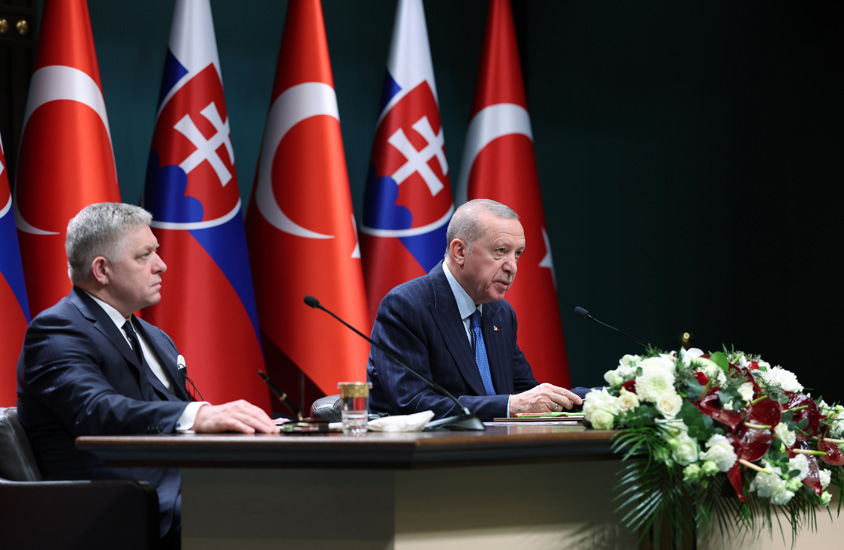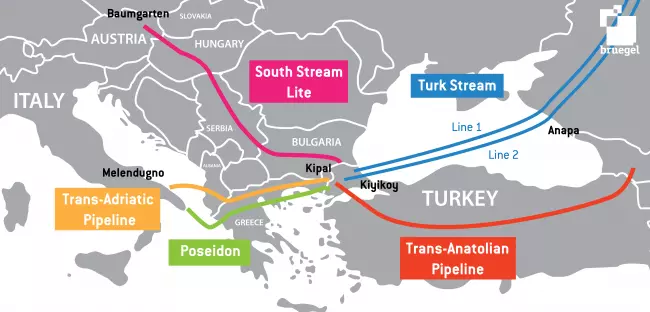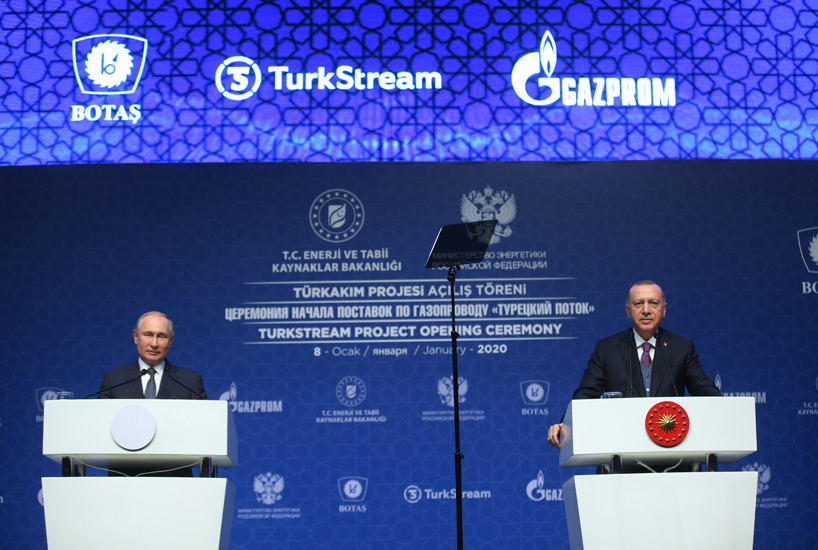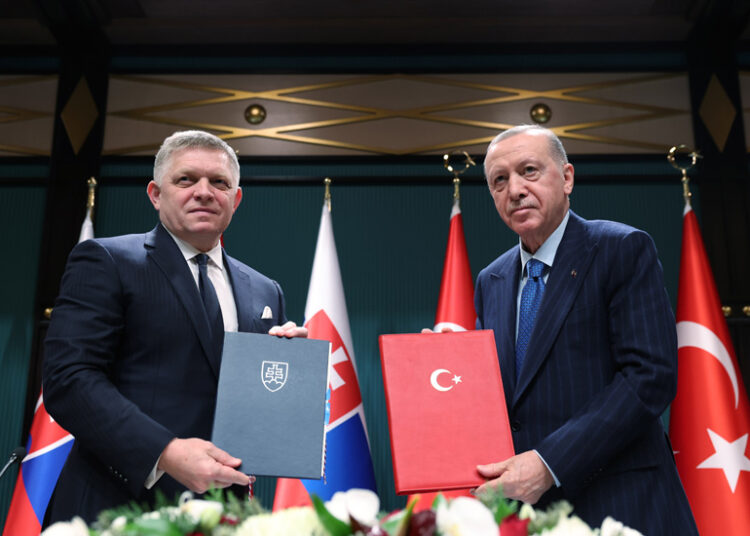Levent Kenez/Stockholm
The Turkish government has intensified efforts to position itself as a key transit alternative for Russian gas to Europe. Following Russia’s invasion of Ukraine, Ankara announced that it would not participate in the sanctions imposed on Moscow by the United States and the European Union, citing its dependence on Russian natural gas. Turkey aims to facilitate gas supplies to countries impacted by route closures caused by the ongoing war.
During a joint press conference with Slovak Prime Minister Robert Fico on January 20 in Ankara, Turkish President Recep Tayyip Erdogan announced a diplomatic initiative to address Slovakia’s natural gas concerns. Erdogan said Turkey was prepared to play a key role in resolving the issue through the TurkStream pipeline, citing ongoing discussions with Russian President Vladimir Putin and Slovak officials. He reaffirmed Turkey’s commitment, saying, “We will take the necessary steps this week to meet Slovakia’s gas needs. Our energy and foreign ministers are already coordinating with their counterparts to finalize this initiative.”

For a long time Ukraine served as a vital transit hub for Russian natural gas flowing to Europe, with Kiev earning substantial transit fees. However, the longstanding agreement expired on January 1, 2025 and was not renewed. Ukraine’s decision to halt Russian gas transit aligns with its strategy to undermine Russia’s war effort by cutting off financing through energy exports. This has left European nations, including Slovakia, scrambling for alternatives.
Slovak Prime Minister Fico recently voiced his concerns, suggesting that the TurkStream pipeline, which transports Russian gas via Bulgaria, Romania and Hungary, could be a viable solution for Slovakia’s energy needs. On December 24 Fico made a surprise visit to Moscow for talks with Putin, becoming one of the few Western leaders to meet with the Russian president since his full-scale invasion of Ukraine in 2022. The discussions centered on Slovakia’s reliance on Russian gas. Fico, a critic of EU support for Kyiv, described Putin as “wrongly demonized” by the West and confirmed that the Russian leader expressed a willingness to continue gas supplies to Slovakia.

Nordic Monitor previously reported that Putin’s plans to use Turkey as a transit hub for natural gas supplies to Europe are not new. On October 13, 2022, during a meeting with Erdogan on the sidelines of the sixth summit of the Conference on Interaction and Confidence-Building Measures in Asia (CICA) in Astana, Kazakhstan, Putin emphasized Turkey’s position as the most reliable route for gas deliveries to Europe. At the time Putin proposed establishing a European gas hub in Turkey, a suggestion that signaled Russia’s intention to diversify its energy export routes amid growing tensions with Ukraine and Western sanctions. In response, Erdogan approached the idea cautiously in front of the cameras and instead redirected the conversation toward the construction of Turkey’s second nuclear power plant in Sinop, located on the southern coast of the Black Sea. However, it appears that Erdogan is now reassessing this as an opportunity in light of the new situation created by Ukraine’s closure of the pipeline.

Pro-government Turkish media outlets highlight the country’s potential role in addressing Europe’s energy challenges amid reduced Russian gas supplies. Reports suggest that Turkey could re-export imported natural gas and LNG to Europe through a process referred to as the “Turkish Blend.”
According to the reports, the EU began reducing its reliance on Russian gas imports following the onset of the Russia-Ukraine war. While Russian gas transported via Ukraine accounted for 11 percent of EU imports in 2021, this figure dropped to 5 percent in the first eight months of 2024. Despite this decline, several EU nations, including Slovakia and Austria, continued purchasing significant volumes of Russian gas. Russia’s gas sales to the EU generated more than $5 billion annually, but the new dynamics are expected to result in a loss of nearly $5 billion in revenue for Gazprom. For Ukraine, the absence of transit fees represents a financial loss of approximately $800 million per year.
Gazprom, which signed a transit agreement with Ukraine’s national oil and gas company Naftogaz in 2019, has already faced substantial losses, with reduced European demand contributing to a $7 billion revenue shortfall — the largest in 20 years. To compensate, the Russian gas giant has pivoted toward exports to China.
With the capacity to import approximately 75 billion cubic meters (bcm) of gas annually, Turkey’s domestic demand of 50 bcm leaves an exportable surplus of 25 bcm. However, increasing export capacity to European markets would require infrastructure upgrades on the Greek and Bulgarian borders.
Turkey currently imports gas from Russia through the Blue Stream and TurkStream pipelines, from Azerbaijan via TANAP and from Iran through the Eastern Anatolian Natural Gas Main Transmission Line. This gas could be exported to Europe through existing connections, including the Western Line and the Trans-Adriatic Pipeline (TAP).
The increased reliance on TurkStream is not without controversy. Russia has alleged attempts by Ukraine and the United States to sabotage the pipeline. Russian Foreign Minister Sergey Lavrov during his annual briefing on January 14 accused the US of attempting to disable TurkStream, reflecting the broader struggle for influence over Europe’s energy supply.
Ukrainian President Volodymyr Zelensky expressed readiness to assist Slovakia in achieving energy stability through alternative arrangements. During a meeting with Slovak opposition leader Michal Šimečka, Zelensky reiterated Ukraine’s commitment to European solidarity and energy security, despite the termination of Russian gas transit.
Meanwhile, when asked by a journalist about his perspective on the most realistic scenario for the ongoing Ukraine-Russia war, President Erdogan expressed deep concern over the conflict and the clashes between the leaders.
“The grain corridor issue is a prime example. Despite our relentless efforts, we couldn’t resolve it,” Erdogan said, recalling that only 30 million tons of grain were transported before the process came to a halt. In 2022 Turkey brought Russian and Ukrainian delegations together for the first time since the start of the war and hosted the signing of a vital grain export deal. However, Russia announced its withdrawal from the agreement in July 2023, citing continued barriers to the sale of its food products.
He elaborated, saying, “Africa, Turkey and many other regions have been demanding grain, but we couldn’t deliver the required quantities. We were stuck at 30 million tons. When I discussed this with President Putin, he expressed willingness to provide grain, and President Zelensky said the same. However, when it came to action, nothing materialized. President Putin made clear that he opposes supplying grain to the European Union via the corridor and prefers to focus on providing it to impoverished nations, particularly in Africa. Despite ongoing discussions, we’ve yet to achieve the desired outcome. Still, my foreign minister continues to engage with his counterparts on the matter.”












